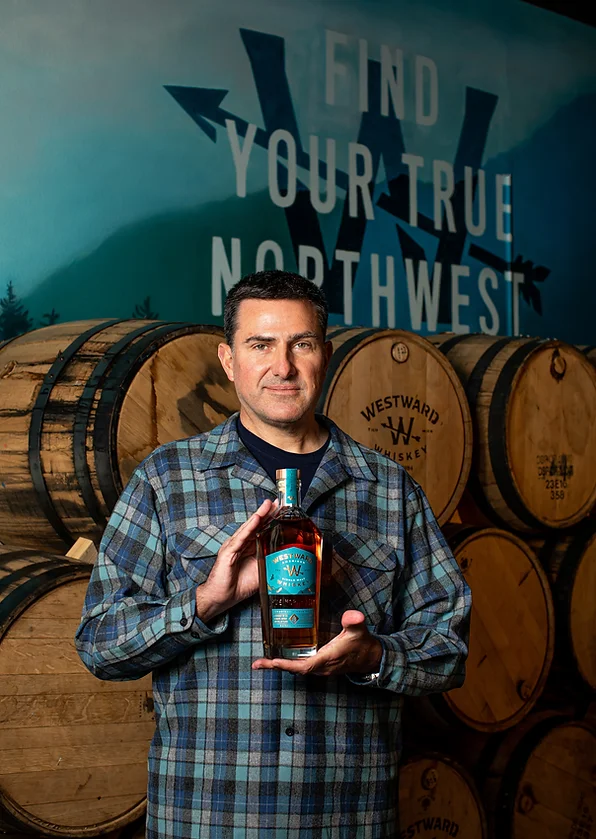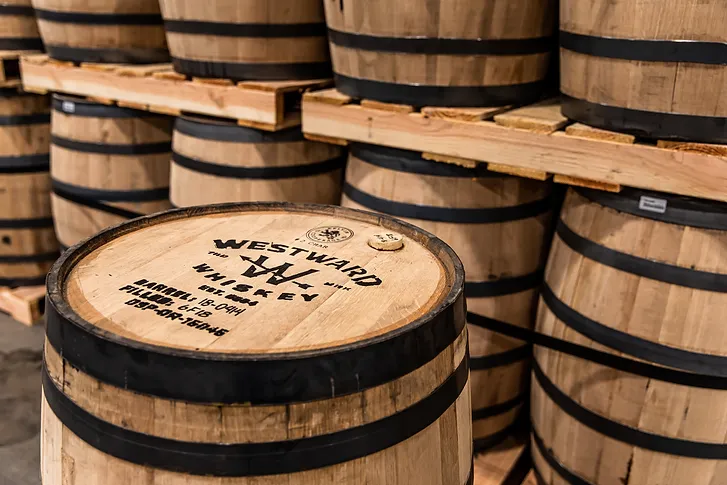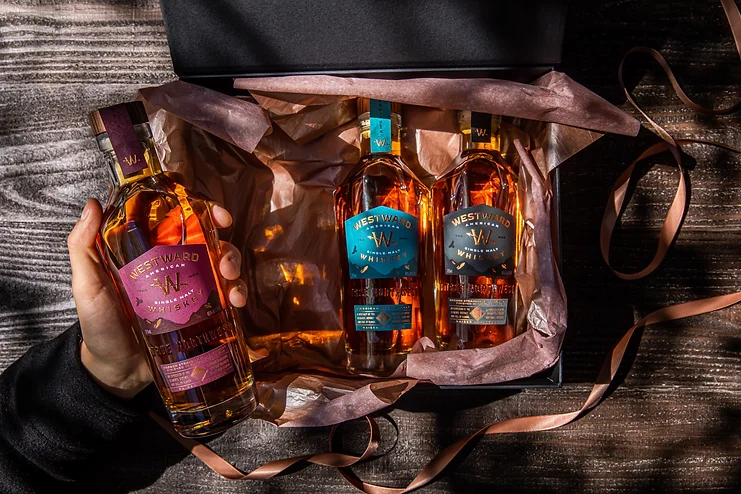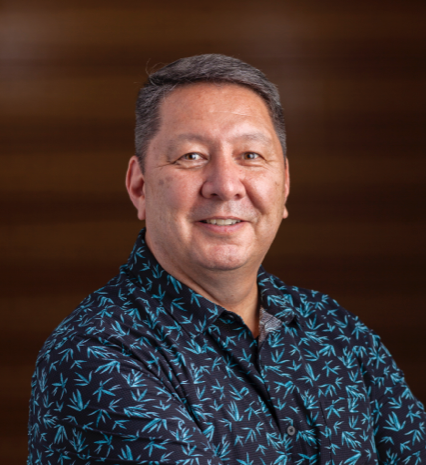The Whiskey Network Interview – Thomas Mooney
There has been a revolution in whiskey gaining momentum for quite some time. A group of innovative whiskey makers have been blazing a new trail. Right before our eyes, the American Single Malt category has officially arrived after many years of quietly growing and evolving to those in the know. There are several brands that have been the bedrock of this movement, and Westward Whiskey is one of the main players in this exciting category.
Established in 2004, they have sought to make whiskey differently by embracing the influence of the American Northwest in everything they do. From humble beginnings, their footprint in Portland, Oregon has grown to an impressive operation. In 2011, Thomas Mooney joined the Westward Whiskey team as Founder & CEO. Realizing his dream to work in the whiskey industry, he has propelled the brand to be a leader on the crowded landscape of craft whiskey.
Thomas Mooney radiates a strong aura of kindness that is blended with an unambiguous sense of purpose. He appreciates whiskey on a deeper level than most; it is both scientific and emotional in nature. Most importantly, he is acutely connected to the emotional component that whiskey drives in the lives of those who enjoy it.
He is a tremendous whiskey enthusiast and is a fantastic ambassador to the whiskey industry. In addition, a conscientious voice who has led by example in the American Single Malt category. In this interview, we explore many things, including his roots with whiskey and the genesis of Westward Whiskey.
Read on to learn more!
To keep up with the latest in whiskey related news, information, and entertainment be sure to visit www.whiskeynetwork.net, enter your information, and hit “Subscribe Now”.

What are your first memories of whiskey?
As a kid, I remember watching those around me enjoy it. I grew up in Guatemala, and some people think that might be the rum capital of the world. However, malt whiskey is very popular in that part of the world. As I became of the legal age to drink, I associate it with milestones and good times with people important to me.
When did whiskey go from something to enjoy socially to a career interest?
In my late twenties I became interested in how it was made versus just how it tasted. Since my educational background is in engineering and science, it helped me really understand this special thing that I enjoyed so much. It got to the point where I was the “whiskey nerd” of my social group, which is common for many of us in this industry.
I would get together with friends or work colleagues, buy a bunch of bottles, and then figure out why we like some more than others. We were just enjoying it empirically as consumers. At that time, I got to an inflection point where I’d gotten about as much as I was going to get out of working for big companies and I wanted to start something up for myself. I have a good friend from grad school who was in the same place for different reasons, and we started looking for businesses we could start. A part of that process was researching and interviewing different people. That led us to Jim Cook, the founder of Boston Beer.
He was generous with his mentorship and was willing to share his experience. His advice was that there was something interesting happening in the spirits industry and that it was different from what was happening in the craft beer industry. People were becoming interested in products from independent producers that were closer to home. We saw that it might be an interesting time to be an independent spirits producer. This led us to Christian Crookston, who had started the original version of our company. We then became partners.
Of course, the first thing we did as whiskey producers was make and market a gin product. (laughs) The gin brand did do well and then we got into making whiskey
That was the transition from enjoying it to making it. I never imagined that it was something that I could do, but here I am.

What is your philosophy for making Westward Whiskey?
I’ll borrow from Christian, as he would say: minimalist cooking. If you use great ingredients and go out of your way to treat them right, then you don’t need to do a lot other than give them time to express themselves. We put tremendous thought into what types and varieties of barley we use and spend a lot of time working with our malting partners. They are grown for flavor and not yield. Also, we are fanatical about yeast discussions and how that choice will have more impact on the flavor of your whiskey than any other single thing you do before and after.
We have a strong belief that Westward will become something wonderful after it goes into a barrel because of everything that happened up to that point. It’s all about how we began with quality ingredients, how we treated them, how we took our time to do the right thing, the low temperature fermentation, the double pot distillation, and everything else before it goes into the barrel.
Tell us more about after it goes into the barrel. How does that impact your whiskey?
To address two bits of conventional whiskey wisdom at once, I’d say the location of our warehouse has a tremendous impact on what Westward becomes. However, the location within the warehouse has very minimal impact on what it is. We mature all our whiskey in Clackamas, which is a few miles outside of Portland.
It’s a place that’s unlike most of the whiskey climates of the world in that it is really two of them stitched together. We have the one that people expect, which is cool, damp, and rainy weather. This goes on for about 6-8 months. Then we have a hot, dry, sunny summer which usually lasts 3-4 months. When it changes, it stops on a dime and flips over. Also, there is variability within the days because we can see temperature swings from 40 degrees to 110 degrees in the summer. This creates some anomalies in the process of how Westward is raised.
First, many whiskey producers worry about the angel’s share driving down the ABV of their whiskey over time. With Westward, ours actually goes up: we are losing more water than alcohol. We’ll put it in the barrel at 120 proof and it can come out anywhere between 125 and 130 proof. That means there is a concentration of flavor, as opposed to a loss. For Westward, aging just isn’t a matter of absorbing the flavor of the oak… it’s giving our whiskey the time to evaporate away the compounds you don’t want to drink.

Westward Whiskey has been at the forefront of the American Whiskey revolution. Exciting things are now happening in that space and there are many voices at the table. Can you tell us more about your involvement and what the future holds?
I’ll give my opinion.
We have been involved since before there was an actual table, it used to be an informal gathering around a barrel. At this stage, we are happy with the standard of identity that the American Single Malt Commission ended up with. We have now been able to publish a philosophy or set of thoughts around the category. It protects the integrity of the category and leaves room for innovation.
I tend to diverge from some of my peers on what is going to happen when there is a legal standard of identity. I’m rooting for legal protection for what American Single Malt means because it’s hard and expensive to do. If you’re going to put that on the label, it should mean something. Again, I am in the minority in our community.
We must remember that consumers have relationships with brands. It is up to every American Single Malt producer to build and expand on those relationships. It is a little different for each one, though. If you were to line up and taste ten of the leading single malt producers here in the US, you’d see that they are all very different. Consumers will probably love one and dislike a few. Depending on the flavor that they are looking for, some of us really nail it and others miss the mark.
Ultimately, I think it will be great to have a legal standard for the category. Then, it will be up to each of us to make a compelling case for our brand. As a whiskey producer, there’s never been a greater need to tell a compelling story that goes beyond the liquid in the bottle.
For the consumer, there has never been a better time to love whiskey.
Can you tell us about the Westward Whiskey line up?
Less than five years ago, Westward Whiskey was a single expression brand with our original single malt. Over the years and through some organic partnerships at home, we have expanded to the Stout Cask, Pinot Noir Cask, and the Cask Strength expressions. All of the sudden, one becomes four. We wanted to make sure that when you find our products that the original expression is there, but that you also find a variety of what we offer.
For example, Cask Strength was the best possible situation in a disruptive way. Another publication named it one of the top 5 whiskeys in the world and led to a ton of interest. Something that was 5% of our brand suddenly became our second-best selling expression. It’s been an interesting and surprising development to have that become a part of the brand.
I think the more time that consumers spend with us, the more they will see that we think there is so much more to whiskey than what has been done. We want to surprise people who love whiskey with something they didn’t expect. Certainly, we have surprised ourselves and not always in a good way. However, most of the things that we didn’t think would work out turned out well. We can do this because we are smaller and relatively newer. For the legacy brands, this would likely be too disruptive.

It’s our tradition at the Whiskey Network to ask our guests the same final 5 questions, also known as the Mashbill: Whiskey Network Wants to Know Your Recipe
Question 1: What was the last whiskey, bourbon, or scotch in your glass?
Westward Original Single Malt.
Question 2: Do you prefer to drink your whiskey from a specific type of glass?
Not particularly, but I do enjoy a rocks glass with a big block of ice.
Question 3: Do you have a Unicorn bottle?
I probably have more unicorn moments than bottles. I think I’m influenced more by the experience of whiskey than by the liquid itself.
Question 4: I’m looking for a gift for a friend. My budget is around $50 to $75. What would you recommend I buy?
I have to recommend that you shop in Oregon and buy a bottle of Westward Whiskey original. We have no sales tax, so it falls within the pricing constraint. I am so immensely proud of our original single malt and would recommend it to anyone.
Based on my time in the industry and the friends I’ve made along the way, I always look at the shelf in a store and think about the people who made the whiskey and not the brand. I go out of my way to recommend wonderful products made by amazing human beings. I just wish more people knew the people behind the brands.
Question 5: What is your favorite toast?
I love to travel, and I love how people around the world toast differently. I try to use the appropriate toast for the area that I’m in. From salud to l’chaim, I think they all work great.
Thomas, on behalf of Whiskey Network Magazine, thank you for taking the time to speak with us. We look forward to hearing more about the amazing Westward Whiskey products and innovations coming soon!
Thank you.
We are proud and excited to welcome Thomas Mooney to the Whiskey Network Family. He is a true whiskey enthusiast and is committed to making whiskey of an elite quality. At the same time, he is a humble and intelligent person who values knowledge, quality ingredients, and craftsmanship. This is what makes Westward Whiskey a leader in the American Single Malt category. We will keep the Whiskey Network audience informed of their progress, new offerings, and accolades.

To keep up with the latest in whiskey related news, information, and entertainment be sure to Subscribe!



